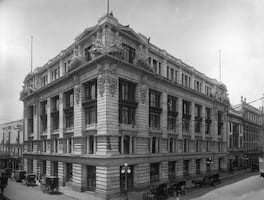Every day, Víctor Pérez covers West Los Angeles . He pushes a blue wooden cart and once in a while sounds a bugle to invite neighbors – American, African American, Latin Americans , but mainly Mexicans – to buy a bit of nostalgia: corns, street corn salad (known as “esquites”), chicharrones and shaved ice treats for USD $2-3. It is hard to imagine that in 2011, these same streets were hell for him because of a woman who wanted to kill him. The reason? Being an immigrant and selling corn in her neighborhood.
Around 3 o’clock, after going through Garth and Guthrie, Víctor makes a stop in Sherbourne street. He is wearing an Oaxaca “Alebrijes” t-shirt , state soccer team, and while he attends his clients he confirms that he is from that Mexican state.
“If I told you everything I’ve lived, you wouldn’t believe me,” he says, smiling.
When he left Oaxaca in 2008 , he did not know what was the American dream ; he just knew that his salary as an upholsterer was insufficient, that he wanted his wife and three kids to live somewhat better, and maybe, sometime, to stop renting and building a house of his own.
By the end of 2011 , a woman identified as Jenna K , who harassed Víctor for being a migrant, tried to run him over with her truck.
He took his chance, kissed his wife, hugged his kids, still very young, and became a “mojado,” just as 150,000 people from Oaxaca who leave their homeland every year because of the lack of opportunities (according to the Oaxaca Institute for Migrants .)
There was no time to rest or tour, the next day after arriving at Los Angeles, he began to work , first, making tamales , and then as a dishwasher , but what he earned was not enough to live and to send money back to Mexico. After much thought, he came with the idea of selling corn, which was not bad at all, since there is a reason why California is called “ Oaxacalifornia ;” for sure he would find compatriots with cravings and nostalgia. He looked where to buy corn in bulk, adapted a cart and started his own business .
“In the beginning, it was very weird for many to hear someone in the street sounding a bugle, but they got used to it. It was my resource to provide for my family. I struggled a lot the first days; I worked three, four, five hours, and I sold nothing because people thought it was not safe or that I would harm them, but later I had clients, I started to sell everything and, until now, I always sell everything I bring.”
The harassment of “the American woman”
Everything went fine until an afternoon in 2010 . On his arrival at Holt street, he noticed an extremely angry, tall, blonde woman wearing sports clothes. Victor had never seen her before and did not understand almost anything she said in English, but he knew that the problem was the color of his skin and being a migrant . What he did not sense was that it was just the beginning of a hell that lasted for three years.
“I hadn’t finished selling when the lady called the police. They took my things and gave me an appointment at Court . The judge freed me but told me that I could no longer sell corns. I left crying because I had done nothing wrong, and I kept selling out of necessity ,” he says.
Walking through the streets of the neighborhood, Victor points out the corners where he was attacked endless times . The American woman always looked for him to offend him and then, call the police arguing that he had hit her, that he committed vandalism , that he poisoned food and, even, that he had tried to touch a girl .
She exercised increasing violence on him that went from insults to hits. One day, for example, she stole his corn cart and hid it in her house; another, she wanted to hit him with a baseball bat.
Víctor could not answer nor report the aggressions because he knew he was at a disadvantage: he was an illegal migrant , invisible, without rights, without justice, who could be deported anytime.
Over the years, the “elotero” from Oaxaca has created a customer base.
“She took me around 15 to 20 times to Court. Once, she screamed that I had hit her and four patrols and an ambulance arrived immediately; they cuffed me and when the paramedics were going to check her, she did not accept and started to make fun of me .”
With a faltering voice, he remembers that what kept him strong was thinking of his wife and kids who knew nothing of what he was living and of what he was about to experience: that afternoon by the end of 2011, when the woman appeared on board of a black truck and tried to run him over .
“She drove her truck towards me, and I got hurt, she backed and did it again, she wanted to kill me . My corn cart tilted, which was what she hit first before me. That was when the people got angry , screamed at her asking why she had done that if I hadn’t done anything wrong, started to record her in video and the police arrived.”
The police officers, who already knew about the racism of the woman due to the tens of phone calls, insisted Victor report her and warned him that if he let it go, she would possible kill him next time .
When he accepted, his life changed . They assigned him a detective called Nelson Hernández , who got moved by the story and promised him justice. However, the following months Victor did not attend the calls of the Court because he never received the summons and they closed the case, but Nelson reopened it to bid Kenna K., the aggressor, over to trial. The final appointment was on January 29th, 2013 .
“Out of desperation, the “gringa” called the migration police on me; one morning, I saw they were waiting for me outside my house, I got very scared and called the detective; he told me not to worry, to show them the documents that proved there was a trial in process and that they could not take me with that. A neighbor helped me translating . That was how they did not take me,” he tells.
On the day of the trial he was terrified ; he didn’t know how things would end and Nelson had told him to take all the evidence of the case; that would define if it has him or her.
Besides the detective and the public defender that they assigned him that day, Víctor had no one; he was all by himself . The American woman, in contrast, arrived with many people, among them lawyers who were going to defend her.
Then, to the Mexican’s surprise, four detectives asking for Víctor Pérez appeared.
“It’s me, I asked with fear, and they told me ‘Guess what? We’re here to support you ,’ I thanked them but I didn’t know how they knew my case; I just heard one telling another; ‘Tell the others to come,’ they were almost a hundred police officers who were also there to give me their support, I couldn’t believe it.”
They all were police officers who, over the years, had attended the endless calls of the woman and knew of her racism . By then, the case was well-known in the area and he was not the only victim of Jenna who, taking advantage of her origin and economic status , used to harass migrants who crossed her way.
After seeing so much support towards Victor, the woman got even more upset and started to accuse him of new things, she even provided a huge map of the neighborhood to tell the judge where, according to her, Victor had committed offenses. The judge asked her to sit down and said that Victor would explain the situation .
When both parts gave their testimonies , the court called for a break of three hours to give the sentence. Three infinite hours for Victor, that ended with a word directed to the American woman: guilty .
Everyone screamed with joy and congratulated him, but that was not all. Nelson informed Victor that he was a candidate for the “U” type visa which, according to the site of migration of the U.S., is destined only for “victims of certain crimes that have suffered physical or mental abuse and help law enforcement agencies and government officials in the investigation or prosecution of criminal activities,” Such visa was created by the Congress in 2000.
“It is until now that I know of the four things the American woman did to me: attempted robbery, discrimination, attempted murder, and racism , with all that, they helped me right away; they told me I qualified for the visa.”
American Dream with a happy ending
Looking at the streets where everything happened, Víctor confesses that he could not believe what was happening to him. Justice had been made for him , for that immigrant from Oaxaca who thought he had no rights in that country, not even for justice. He says that while his voice falters and he cries.
“I’m very happy. Now I’m here legally , they gave me my work permit , they gave me insurance , my California ID , and the detective told me to keep up the good work because I had the right to bring my family and my wife and kids are already with me,” he says.
In 2016 , Víctor got a license to visit his family in Oaxaca and to speed the paperwork for their move to Los Angeles. He was shocked when he could not recognize his sons, they were already teenagers. He had missed all their childhood, but he could finally take them with him and start over .
His wife and his younger daughter arrived in the U.S. in February 2017 , and in September 2018 his other sons arrived. They had a great celebration for Christmas 2018 where they could finally be together.
Currently, Víctor still sells corn and is very cherished in the neighborhood . Sometimes he sees the police officers who helped him and they greet him and ask how the business is doing.
He could finally buy a house in Oaxaca and next week he will start the paperwork to obtain his residency . He is planning to visit Mexico soon, which he loves because the food tastes better and it is his homeland, but confesses that he is already used to his neighborhood in Los Angeles , as well as his neighbors and his business. The dream of his family is to be able to buy a house there.
With his voice still faltering and with tears in his eyes, Victor, who is 43 years old, says that he is proud of the business that has given him so much in the U.S.
“It is now that I finally understand that my American dream came true ,” he concluded. He sounds the bugle once more and goes through the streets with American names that are now his and where he can finally pass in total freedom, fearless .
Angélica Vale, one of his clients
Just as he has lived terrible stories, Victor also has stories that he remembers with joy, as having sold corn to the Mexican actress Angélica Vale . He ran into her in one of the streets where she excitedly called him wanting to know what he sold and, upon knowing, she bought corn for her and her friends. The actress also remembers that episode as something quite particular because it was weird to find an “elotero” in his cart in Los Angeles.
“I was driving, and I saw a corn cart; it’s not common in there. I don’t remember where I was headed because I was not near home and all of a sudden I turn my head and I see this sir selling corns, and despite the traffic, being late, I stopped and asked him to come. I bought my corns and I was the happiest woman in the world. I loved meeting him. I’m dying to go back and have another corn. He told me his story and I find it amazing. How nice and in these times! I think it’s a clear example that we Mexicans go to the U.S. to work and we don’t steal from anyone . I doubt any “güero” would sell corns in the street, and if he did, it wouldn’t work.”
mp
Noticias según tus intereses
[Publicidad]
[Publicidad]


















